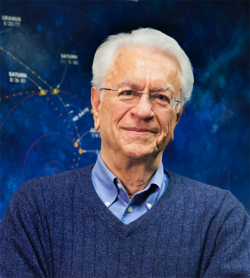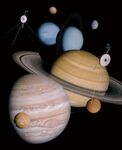Biography:Stamatios Krimigis
Stamatios (Tom) M. Krimizis | |
|---|---|
 Stamatios (Tom) M. Krimizis | |
| Born | Stamatios M. Krimizis September 10, 1938 Vrontados, Chios, Greece |
| Citizenship | Greece · United States |
| Title | Head Emeritus, Space Department |
| Scientific career | |
| Thesis | An interplanetary diffusion model for the time behavior of intensity in a solar cosmic ray event (1965) |
| Doctoral advisor | James Van Allen |
Stamatios (Tom) Mike Krimizis (Greek: Σταμάτιος Κριμιζής, born September 10, 1938) is a Greek-American scientist in space exploration. He has contributed to many of the United States' unmanned space exploration programs of the Solar System and beyond. He has contributed to exploration missions to almost every planet of the Solar System.[1][2] In 1999, the International Astronomical Union named the asteroid 8323 Krimigis (previously 1979 UH) in his honor.[2]
Biography
He was born in 1938 in Vrontados of Chios, Greece, where he attended school.[2] In the United States he studied at the University of Minnesota, and earned his Bachelor of Physics, 1961, his Master of Science at the University of Iowa in 1963 and his Ph.D. in 1965 in Physics.[2] He was a student of James Van Allen.[2]
He is Head Emeritus of the Space Department Applied Physics Laboratory at Johns Hopkins University Laurel, Maryland, United States and he is a member of Academy of Athens, Greece, where he has the Chair of Science of Space.[2] He is also the President of the Greek National Council for Research and Technology.[1]
Krimigis has been the Principal Investigator for MIMI on Cassini–Huygens, the Low Energy Charged Particle Experiment (LECP) on Voyager 1 and Voyager 2, and for the CPME on Explorer 47.[3]
He is Co-Investigator for LAN/HI-SCALE on Ulysses solar polar orbiter, EPIC on GEOTAIL, EDP for Galileo mission, TRD on Mariner 3, and for the LECR on Mariner 4.[2][3] Krimigis has also worked on the Advanced Composition Explorer, the Mariner 5, MESSENGER and New Horizons programs.[3]
Krimigis was featured in the 2017 documentary film The Farthest about the Voyager program.
Honors
- Fellow, APS, AGU, AAAS, AIAA.
- Lifetime Achievement Award, Johns Hopkins Applied Physics Laboratory (2004).
- Member of the Academy of Athens, Chair of Science of Space (2004).
- COSPAR Space Science Award (2002).
- Smithsonian Institution Trophy (2002).
- Aviation Week and Space Technology Laurels in Space Award (1996, 2001).
- NASA Medal for Exceptional Scientific Achievement (1981, 1986).
- Basic Sciences Award, International Academy of Astronautics (1994).
- Council of European Aerospace Societies Gold Medal (2011).
- National Air and Space Museum Lifetime Achievement Trophy Award (2015).
- Hellenic Physical Society Award, for major contributions to science in Greece and abroad (11 May, 2015)[4]
- American Astronomical Society Space Flight Award (2015).[5]
- NASA Distinguished Public Service Medal (2016).[6]
- Over 40 NASA and ESA Group Achievement Awards.
References
- ↑ 1.0 1.1 Brief Curriculum Vitae and publications, Johns Hopkins University.
- ↑ 2.0 2.1 2.2 2.3 2.4 2.5 2.6 Europlanet Interview: Stamatios (Tom) Krimigis, Europlanet.
- ↑ 3.0 3.1 3.2 STAMATIOS M. KRIMIGIS. "STAMATIOS M. KRIMIGIS - Curriculum Vitae". Johns Hopkins Applied Physics Laboratory (APL). http://sd-www.jhuapl.edu/CASSINI/SMK_BriefBio&Publ_9-10.pdf. Retrieved 2012-03-05.
- ↑ "Announcement of ΕΕΦ Award" (in el-gr). https://www.uoa.gr/fileadmin/user_upload/PDF-files/ekdilwseis/Ekdilwseis/2015/VraveysiStamatiKrimizi11052015.pdf.
- ↑ "Space Flight Award | American Astronautical Society". https://astronautical.org/awards/space-flight/.
- ↑ "Press Release". http://jhuapl.edu/newscenter/pressreleases/2016/160701.asp.
External links
 |

